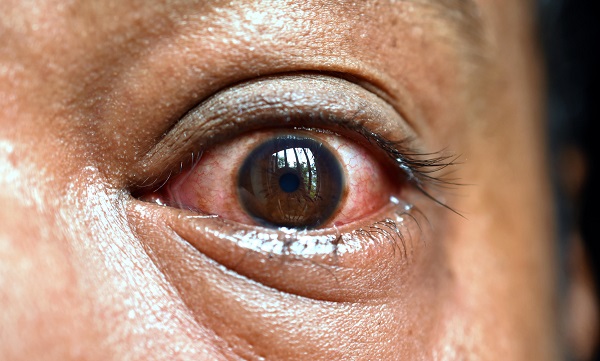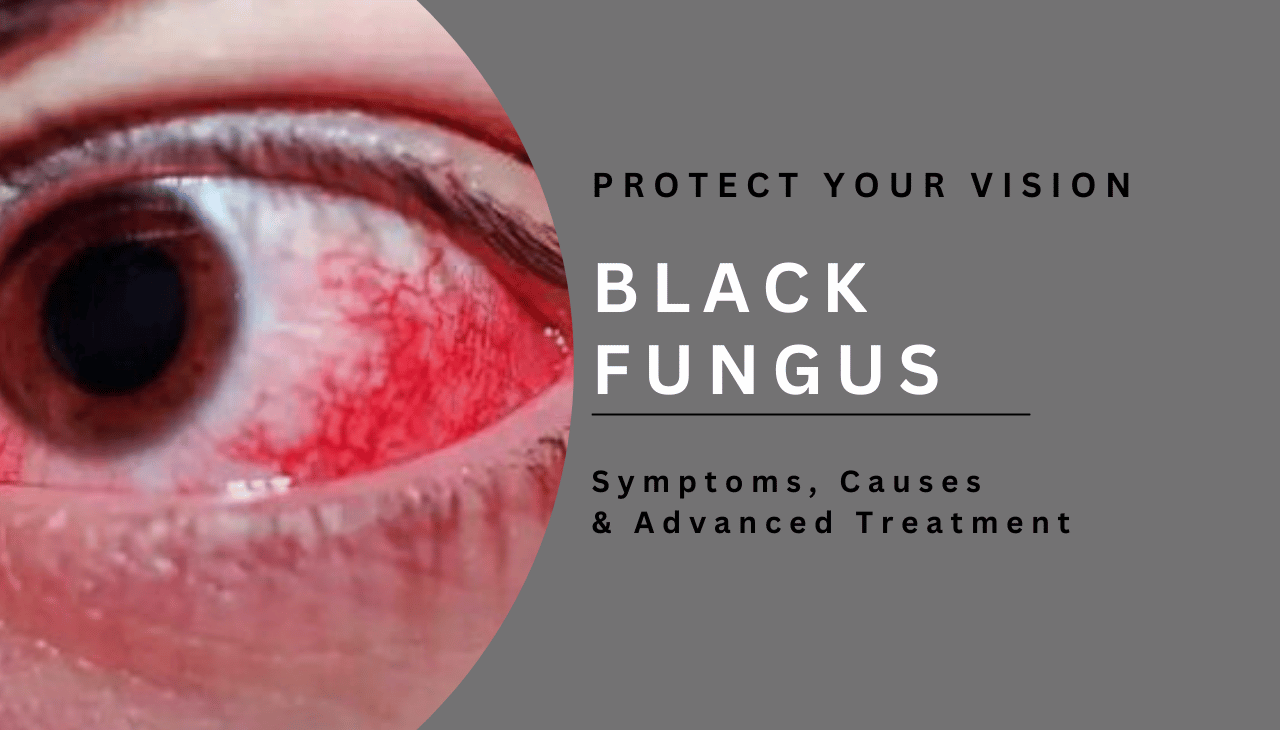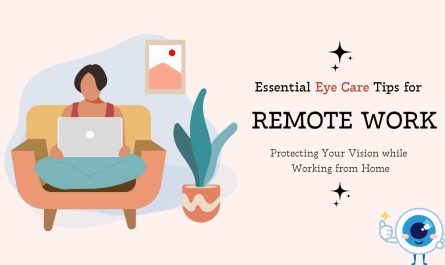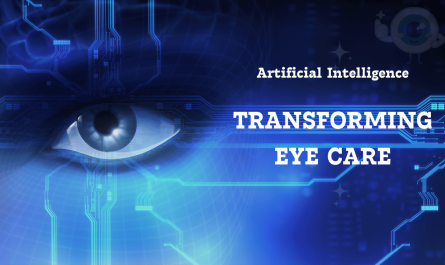Introduction
Black fungus, also known as mucormycosis, is a rare but serious fungal infection that has gained attention due to its increasing prevalence, especially in individuals with weakened immune systems. It can affect various parts of the body, including the eyes, and can lead to severe complications if not diagnosed and treated early. Mucormycosis in the eye can cause vision loss and other complications, making Retina Treatment and Glaucoma care essential aspects of its management. Understanding the symptoms, causes, and treatment options for black fungus in the eye is essential to prevent vision loss and other health complications. In this blog, we will explore what black fungus is, its symptoms, causes, available treatments, and expert recommendations.
Understanding Black Fungus in Eye
What is Black Fungus?

Black fungus (mucormycosis) is a fungal infection caused by a group of molds called mucormycetes. These fungi are commonly found in the environment, especially in soil, decaying organic matter, and even air. While they do not typically cause harm to healthy individuals, they can be life-threatening for people with compromised immune systems.
How Does it Affect the Eye?
When mucormycosis affects the eye, it is known as rhino-orbital mucormycosis. This condition can rapidly spread from the nasal passages and sinuses to the eye, causing serious complications such as vision loss and even affecting the brain if not treated promptly.
Causes and Symptoms of Black Fungus
Causes of Black Fungus in the Eye
The primary cause of black fungus infection is exposure to mucormycetes fungi, which can enter the body through inhalation, ingestion, or open wounds. Some key risk factors include:
- Uncontrolled diabetes: High blood sugar levels weaken the immune system, making individuals more susceptible.
- Prolonged use of steroids: Steroids, commonly used to treat severe COVID-19 and other inflammatory conditions, suppress the immune system.
- Weakened immune system: Cancer patients, organ transplant recipients, and those on immunosuppressive therapy are at a higher risk.
- Prolonged ICU stays: Critically ill patients who require prolonged hospitalization are vulnerable.
- Exposure to contaminated environments: Dusty construction sites and poor hygiene can increase exposure to fungal spores.
Symptoms of Black Fungus
Early detection is critical for successful treatment. Common symptoms include:
- Redness and swelling in the eye
- Blurred or double vision
- Pain or numbness around the eye
- Dark patches or discoloration around the nose and eyes
- Bulging of the eye (proptosis)
- Loss of vision in severe cases
- Facial pain and headache
- Nasal congestion with blackish discharge
If you experience any of these symptoms, seek medical attention immediately.
Treatment Options for Black Fungus
Diagnosis
A timely diagnosis is crucial to prevent complications. Doctors may use the following diagnostic methods:
- Clinical examination to check for swelling, discoloration, and vision loss.
- MRI or CT scans to detect the extent of the infection.
- Biopsy and fungal culture to confirm the presence of mucormycosis.
Treatment Methods
Once diagnosed, treatment should begin immediately. The primary treatment options include:
- Antifungal Medications: Amphotericin B is the most commonly used antifungal drug, administered through IV to stop the spread of the infection.
- Surgical Removal: In severe cases, surgical debridement may be required to remove infected tissue and prevent further spread.
- Control of Underlying Conditions: Managing diabetes and reducing steroid usage can help prevent further infection.
- Hyperbaric Oxygen Therapy: Some studies suggest that high-pressure oxygen therapy can inhibit fungal growth and promote healing.
Expert Consultation at Laxmi Eye Hospital
Laxmi Eye Hospital is one of the largest chains of eye hospitals in Mumbai, with over 30 years of expertise in eye care. The hospital is known for its experienced eye doctors and transparency in treatment, offering world-class diagnostic and sophisticated eye care services in Panvel, Kharghar, Kamothe, and Dombivli.
Their specialization includes:
- Specs Removal / LASIK (Bladeless LASIK, ICL, IPCL, Contoura Vision LASIK)
- Cataract Surgery
- Glaucoma Treatment
- Diabetic Eye Care
- Cornea Clinic (Common Corneal Disease, Keratoconus Management, Eye Donation)
- Retina Treatment
- Pediatric Ophthalmology
For consultation, visit:
- Laxmi Eye Clinic (Dombivli) – SS Business Park, Dombivli East, Mumbai.
- Laxmi Eye Clinic (Kharghar) – Anant CHS, Sector 04, Kharghar, Navi Mumbai.
- Laxmi Eye Hospital & Institute (Panvel) – Old Panvel, Navi Mumbai.
- Laxmi Eye Institute (Kamothe) – Near ICICI Bank, Kamothe, Navi Mumbai.
Frequently Asked Questions (FAQs)
Q1: Is black fungus contagious?
No, black fungus is not contagious. It does not spread from person to person.
Q2: Who is at the highest risk of black fungus infection?
People with uncontrolled diabetes, prolonged steroid use, weakened immune systems, or those recovering from COVID-19 are at the highest risk.
Q3: Can black fungus in the eye be treated?
Yes, if detected early, black fungus can be treated with antifungal medications and, in some cases, surgery.
Q4: How can I prevent black fungus infection?
Maintain proper hygiene, manage diabetes, avoid prolonged steroid use, and wear masks in dusty environments.
Q5: Can black fungus cause permanent blindness?
In severe cases, black fungus can lead to permanent vision loss if not treated promptly.
Q6: How soon should I seek medical help if I notice symptoms?
You should seek immediate medical attention if you experience any symptoms, as early intervention can save your vision and overall health.
Conclusion
Black fungus in the eye is a serious condition that requires immediate medical intervention. Understanding its symptoms, causes, and treatment options can help in early detection and prevention. If you or someone you know is experiencing symptoms, consult an eye specialist immediately. Laxmi Eye Hospital offers expert eye care services to diagnose and treat complex eye conditions with precision and care. Don’t delay—prioritize your vision health today!
For expert consultation, visit Laxmi Eye Hospital in Mumbai and book an appointment today!




